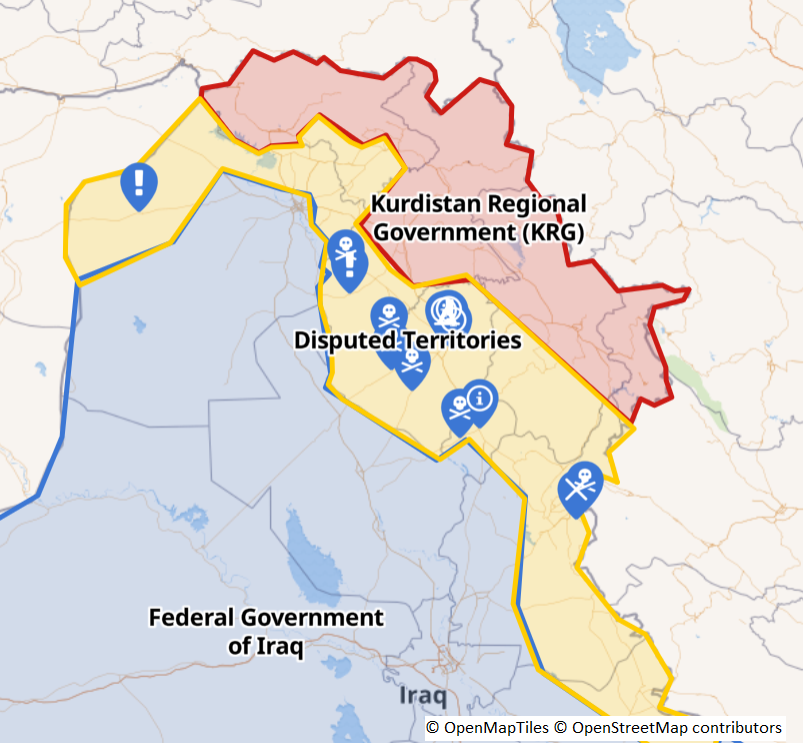1.4K
Kirkuk
- After pressure by Iranian-backed Popular Mobilization Units (PMU), the department of Petroleum revoked its previous decision to change all distribution station managers for alleged corruption cases. The gas distribution is considered one of the most corrupt sectors in the country. Since October 16, 2017, it had become the main source of income for the Iranian-backed militias in the province. Additionally, the PMU is involved in drug trafficking and has the upper hand over the rest of Kirkuk’s security forces. The province is facing a severe gas shortage and high prices.
- Ingibjörg Sólrún Gísladóttir, the Deputy Special Representative for Iraq for Political Affairs and Electoral Assistance, visited Kirkuk and held a meeting with the Independent High Electoral Commission (IHEC). The Turkey-backed Iraqi Turkmen Front rejected her visit and engagement with the newly appointed officials of the IHEC stating “the visit of the UNAMI delegation to Kirkuk and the meeting with the new administration of the Independent High Electoral Commission office is nothing but an uncalculated step by the UN mission.” Between Turkey’s pressure and internal division by its Sunni and Shia ranks, the Turkmen Front fears losing all three of the parliamentary seats they won in 2018.
- The police arrested 15 employees and the general director of the State Company for Trading Grain – Kirkuk on corruption charges filed by the Integrity Commission. According to the Integrity Commission, the officials changed the type of grain distributed to the public, estimating the loss of six million dollars. The officials are accused of “waste of public money.”
- On Tuesday, June 16, Iraq’s Ministry of Education announced the decrease of courses included in ministerial examinations to help students pass the school year after months of lockdown due to the pandemic. However, the decision excluded the Kurdish studies of Kirkuk, which raised anger among the Kurds. Discriminatory policies and Arabization have dramatically increased against the Kurds since October 16, 2017.
- On Thursday, June 10, ISIS (Da’esh) attacked a residential complex in the Riyad sub-district resulting in the death of a father and son. On the same night, several Da’esh terrorists kidnapped two people in Hamel village of Rashad sub-district.
- On Friday, June 11, Da’esh IEDs disabled three power towers near Rashad’s Acadia village. The towers connect electricity between Kirkuk and Tikrit cities.
- On Friday, June 11, the Iraqi interior ministry placed both federal and local police on high alert after reports of terror attacks in the city center.
- On Sunday, June 13, Da’esh attack on a checkpoint near Riyad resulted in the death of a federal police captain. Clashes between the terrorists and police resulted in the police officer’s death from the first brigade of the third division. On the same day, the federal police announced the discovery of a Da’esh bomb factory near al Shajara village in Hawija. According to the police statement, the terror group used the factory to make IEDs and rockets. On Monday, the federal police launched a sweep targeting Da’esh in Aqulah, Salamyah, and Babojan villages of Hawija. However, the security search did not result in any results or findings of Da’esh hideouts.
Khanaqin
- Similar to other disputed territories, Da’esh terrorists continued targeting vital facilities in Khanaqin, including bombing two power towers transferring electricity to the city from Baqubah. Despite creating joint command centers between Baghdad and Erbil, the security vacuum remains as the Peshmerga forces have not been allowed into the area. Iraqi security forces, including Iranian-backed militants, have been unable to secure the region since October 16, 2017.
- The water shortage in Khanaqin hit another low degree due to drought and Iran’s cut of water supplies to Sirwan and Alwand rivers. The water department in the city has supplied the public with water once a week only as it announces “complete dry out of 37 wells.”
Tuz Khurmatu
- Both Kurds and Turkmen are at risk of losing parliamentary seats in the upcoming election on October 10, 2021, due to the new election laws dividing each province to multi electoral districts. The Kurds have candidates from different parties, while the Turkmen have four candidates, including an independent and three more on behalf of al Sadr, al-Hakim, and the Turkmen Front.
- Da’esh terrorists attacked Yengejeh village west of the town on Monday. After clashes with villagers and security guards, one person was killed, and no casualties among Da’esh were reported.
Makhmour
- The Turkish Foreign Affairs Minister Mevlüt Çavuşoğlu renewed threats to invade the UN refugee camp of Makhmour holding Kurds from Turkey. Like Turkey’s President Erdogan, Çavuşoğlu accused the camp of housing members of the Kurdistan Workers’ Party (PKK). Iraq, the US, and many regional and internal states denounced Turkey’s recent airstrikes on the camp. The United Nations established the camp in 1998 and Turkey has attacked it through airstrikes on several occasions.
- According to IQIRAQ news, the National Security Council has warned Iraq’s Prime Minister Mustafa al Kadhmi of Da’esh activities in the Qara Chokh, especially in the triangle between Kirkuk-Mosul-Tikrit. Alone in 2021, the US-led coalition launched hundreds of airstrikes in the area.
Shingal
- The Iranian-backed PMU in Shingal (Sinjar) threatened to face Turkey if they attempted to invade the town. On Monday, June 14, Iraq Interior Minister Othman al-Ghanimi announced the formation of a new local police force in Shingal, constiting 1500 Yazidis to take over the security file in the town. al-Ghanimi’s announcement came after his visit to Mosul and meetings with security and local government officials. The Yazidi town remains under the control of several forces, including PMU, PKK-offshoots, Iraqi military, and some Peshmerga forces in its suburbs. Baghdad and Erbil also have a security agreement for the region, pending implementation.

